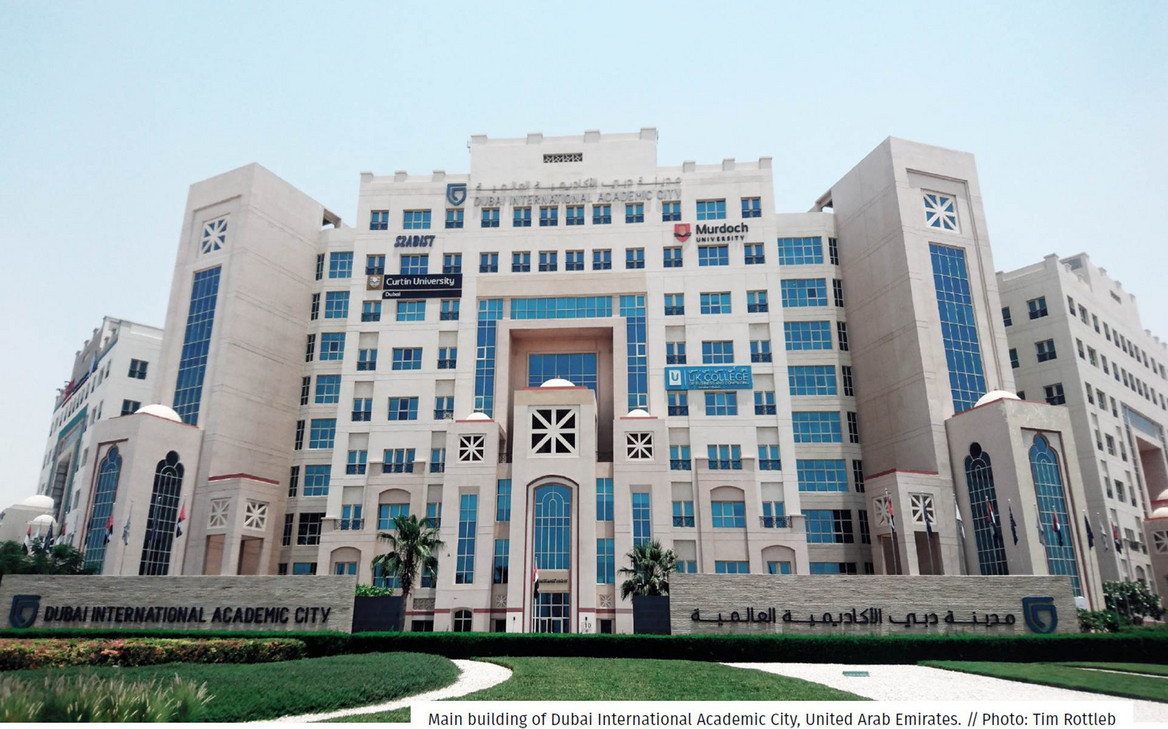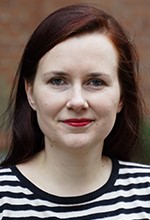Main Content
"Hopeful despite uncertainty"
Interview with the IRS Junior Research Group Leaders Jana Kleibert and Monika Motylinska

The IRS currently hosts two junior research groups funded by prestigious programmes. Urban and economic geographer Jana Kleibert has been researching how higher education is marketed in international "branch campuses" with her Leibniz Junior Research Group "Constructing Transnational Spaces of Higher Education" (TRANSEDU) since 2018. Architectural historian Monika Motylinska and her junior research group "Conquering (with) Concrete", funded by the Volkswagen Foundation's Freigeist Programme, have been investigating what German construction companies contributed to the globalisation of architecture in the 20th century since the beginning of 2020. In the interview, the two researchers reflect on the current state of their research groups' work and explain how they are dealing with the challenges of the Corona pandemic.
Dr Kleibert, Dr Motylinska, you have both acquired third-party funding for one junior research group each with three doctoral researchers in very competitive programmes. What does that mean for you as postdocs and for your academic careers?
Kleibert: It means a big leap: the opportunity to carry out a more extensive project over five years and to tackle a larger research topic that also allows comparative research. I have more freedom and more responsibility, including staff responsibility. Moreover, leading a group independently also makes you more visible.
Motylinska: Becoming a Freigeist Fellow has been my goal and dream ever since I learned about this programme during my PhD. For the current stage in my academic career, it really is the best scenario I could imagine.
What do you enjoy in this function and what is difficult?
Kleibert: I really enjoy working in the team. I can't think of anything off the top of my head that I don't enjoy. However, the Corona pandemic, which threw our plans out of kilter and forced us to cut short our field research visits, is causing difficulties.
Motylinska: For me, it is very exciting and gratifying to observe how the ideas from the project proposal are implemented and elaborated in the team. The constant exchange with all team members - not only with the three PhD students, but also with our research assistants and the close cooperation partners from Ghent University (Prof. Johan Lagae and his team) - is certainly something that motivates me even in the most difficult months of uncertainty. For the difficulties are indeed caused by the global pandemic, including for us the general unplannability and impossibility of field research, which is central to our project.
What is the role of the IRS - for winning your respective grants and as the place where your groups are based?
Kleibert: The IRS offers a good environment and support. The group is involved here in many ways. The PhDs in the project have many opportunities for exchange, for example through the IRS PhD group or the Spring Academy. The willingness to change structures is also very good: the IRS has integrated the independence of the junior research groups into its work processes. I look forward to Monika Motylinska's group being complete and getting started!
Motylinska: The IRS played a decisive role in both the acquisition and the implementation of the project, because there are not many places where truly interdisciplinary research between diverse space-related historical and social science fields would be possible at all. Furthermore, we benefit from the experience of Jana Kleibert's junior research group - organisationally, but also in terms of content.
Dr Kleibert, what distinguishes the format of the Leibniz Junior Research Group from other formats?
Kleibert: It is a classic junior research group similar to the DFG's Emmy Noether Programme. However, it is a great innovation to have such a format in the Leibniz Association. The first cohort started in 2018 with eight groups, including ours, spread across Germany. It has the character of a pilot project.
Dr Motylinska, what is special about the Volkswagen Foundation's Freigeist Programme?
Motylinska: The Freigeist programme seeks to promote risky and innovative projects that would otherwise fall through the cracks of the usual disciplinary boundaries. It also places great emphasis on research communication, for example through training courses in this area.
Where are your research groups at the moment?
Motylinska: In January, two new PhD students, Sadia Amin and María Jeldes, completed the team. We were thus able to start the most exciting phase: the shaping of the individual projects, but also the joint projects. We intensively discussed our disciplinary approaches and perspectives from architectural and urban history as well as global history, economic geography, social anthropology and urban studies at our quarterly meeting on 4 and 5 February. This was also a good opportunity to summarise the results of the first, historically oriented phase of the project.
Kleibert: Our research group has now been in existence for two and a half years. We have completed the data collection and have already published a number of articles in journals and prepared data in a report for stakeholders. This year, the three PhD students, Alice Bobée, Tim Rottleb and Marc Schulze, are busy writing their dissertations and we discuss our results at (digital) conferences and in webinars.
What has surprised you in the course of your projects so far?
Kleibert: What an exciting research gap we have come across. We are the only group that deals with international higher education from an economic and urban geography perspective. That still surprises me. I am still coming up with more ideas for further questions. I was also surprised that Europe is such an important location for educational investment, especially Berlin. That was not so visible in previous data collections. Brexit is proving to be a driver for increased investment within the EU. I started with observations from Malaysia, Singapore and the Gulf States and wanted to understand why entire "Education Cities" are being built there for international higher education.
I am also constantly surprised by the matter-of-factness with which higher education is turned into a commodity. Education is perceived in many places as a commodity, a service sector with export profits. Universities make investment decisions as transnational corporations to "conquer" new markets.
Motylinska: From a historical perspective, what is particularly surprising is the manifold activity of German construction companies in Latin America during the interwar period. I also didn't expect so many architects and engineers to be interested in tropical construction in the 1930s - and to actually implement their plans. Nevertheless, I am sure that the biggest surprises await us during the field research.
Your research projects are to include numerous research trips - to North and West Africa, the Gulf region, Latin America, South and South-East Asia. How has the corona pandemic affected your research?
Motylinska: The first lockdown (in March 2020) began in the third month of the project, so in this respect it is no exaggeration to say that the consequences of the pandemic are devastating, because not all research trips can be postponed at will. And without a solid empirical basis, we cannot deliver important research results either. That is why we have so far concentrated mainly on archival research in Germany, at least in the months between the closures of the archives. So in this respect, too, the pandemic represents a huge break.
Kleibert: Two of the team were on the road (Tim Rottleb in the Gulf States and Alice Bobée in France) and had to be flown back. That was bitter, the interviews were all planned after weeks of communication, the trips were organised, we were on site. Other planned trips had to be cancelled. We were lucky in that we had already been collecting data since 2018 and had already completed an initial fieldwork phase. We then reorganised, conducted some planned interviews digitally and processed the data we had already collected. We ended up with a total of 135 interviews with decision-makers. And then we decided that this would have to be enough in this situation.
And we asked ourselves how Corona is changing our field of research, as the globalisation of higher education is massively affected by the travel restrictions. We have secured a new research project from the Regional Studies Association on the impact of the Corona pandemic and are now getting to the bottom of the question.
How do you look to the future? What do you wish for?
Motylinska: Despite the uncertainty I am hopeful, because even in the most difficult months of the lockdown we were able to continue intensive research. However, my biggest wish is - as soon as it will be possible - to start field research in the target regions of the project.
Kleibert: Positive. I'm just looking forward to being able to meet with my team again in person and not just via small screen tiles - and to being able to continue working on the issue in the longer term.
What do you recommend to postdocs who want to advance their scientific career?
Motylinska: It is difficult to give general advice. I would like to emphasise that there are many paths in science - and also many goals, there is no ideal career path (even if it sometimes seems that way from the outside). And if you enjoy teamwork and research outside of your comfort zone, you are certainly in good hands in the role of a junior research group leader.
Kleibert: Be passionately curious and unreasonably persistent! Intrinsic motivation and perseverance are important in my experience. Everything else is overrated.


